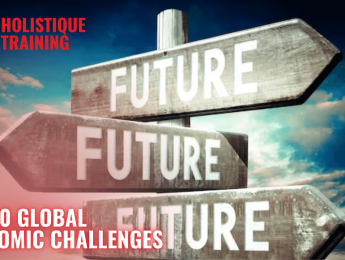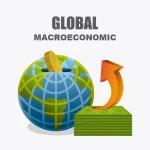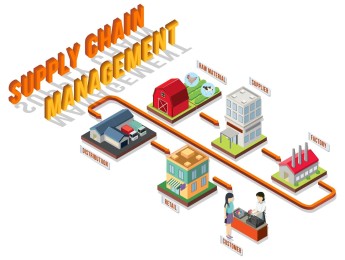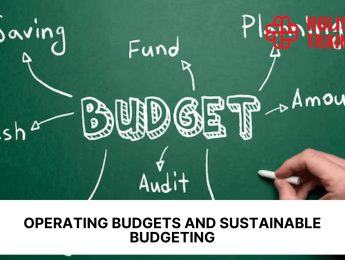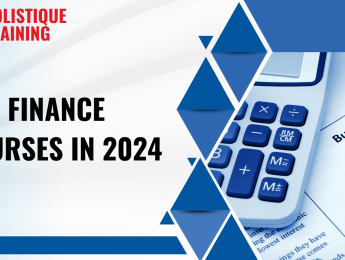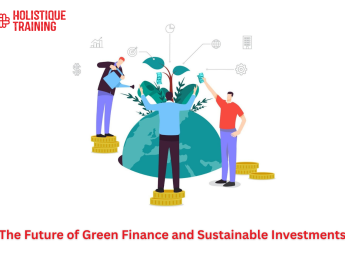- Table of Contents
- Introduction
- The Economy Post-COVID-19
- Global Macroeconomic Prospects
- Top Ten Global Economic Challenges
- 1. Supply Chain Disruptions
- 2. Debt Overhang
- 3. Inflationary Pressures
- 4. Climate Change and Environmental Risks
- 5. Technological Disruptions
- 6. Demographic Shifts
- 7. Geopolitical Tensions
- 8. Financial Instability
- 9. Health System Resilience
- 10. Access to Education and Digital Divide
- What Is the Future Looking Like?
- 1- Fostering Sustainable Growth
- 2- Enhancing Digital Inclusion
- 3- Strengthening Global Cooperation
- 4- Promoting Innovation and Reskilling
- 5- Maintaining Fiscal Discipline
- The Rise of Sustainable Finance
- The Digital Renaissance and Inclusive Innovation
- Remote Work and Virtual Collaboration
- E-Commerce and Digital Transactions
- Fintech and Financial Inclusion
- Blockchain Technology
- Digital Literacy and Education
- Telemedicine and Health Tech
- Data Privacy and Cybersecurity
- Government Digitisation Initiatives
- SME Empowerment
- Blockchain for Social Impact
- Conclusion
Introduction
The COVID-19 pandemic of 2020 and its subsequent impact on the global economy ushered in a new era of uncertainty, exposing vulnerabilities and creating complex challenges that policymakers, businesses, and individuals must grapple with. As we move past the initial shock of the pandemic, it is essential to assess the current state of the global macroeconomic landscape and explore the potential risks and challenges that lie ahead. In this blog post, we will delve into the economy post-COVID-19, global macroeconomic prospects, the top ten global economic challenges, and a glimpse into the future.
The Economy Post-COVID-19
The COVID-19 pandemic was a seismic event that shook the very foundations of the global economy. Its rapid spread across continents forced governments to implement strict lockdowns and social distancing measures to curb transmission, causing a simultaneous supply and demand shock. Industries such as tourism, hospitality, and retail were hit hardest, leading to widespread job losses and economic contractions.
Governments and central banks responded with unprecedented fiscal and monetary measures to provide financial support and stimulate demand. While these measures played a crucial role in preventing a total economic collapse, they also raised concerns about soaring public debts and potential inflationary pressures.
With economies reopening, there is hope for a robust recovery. However, disparities in vaccine distribution and the emergence of new variants create lingering risks to the pace of the recovery.
Global Macroeconomic Prospects
The post-COVID-19 economic recovery has been a mixed bag, with some countries rebounding faster than others. Advanced economies with ample fiscal space and efficient vaccination rollouts have shown signs of a V-shaped recovery. However, developing economies, especially those heavily reliant on tourism and commodity exports, face a more prolonged and uneven recovery path.
Additionally, the divergence in economic performance between nations poses challenges for global financial stability and could lead to greater income inequality both within and between countries. Coordinated efforts and international cooperation are crucial to address these disparities and ensure a more inclusive recovery.
Top Ten Global Economic Challenges
As we explore the global macroeconomic risks and challenges post-COVID-19, it becomes evident that the road to recovery is paved with obstacles that demand thoughtful consideration and strategic planning. In this section, we will delve deeper into the top ten global economic challenges that policymakers and leaders must grapple with in the coming years. These challenges encompass a wide array of issues, from supply chain disruptions to demographic shifts, each requiring unique approaches for mitigation and resolution. Let's now explore these challenges in detail:
1. Supply Chain Disruptions
The pandemic laid bare the fragility of global supply chains, disrupting industries across the board. Over Reliance on specific regions and a lack of diversification highlighted the urgent need for more resilient, adaptable, and flexible supply networks. Governments and businesses must now prioritise building redundancy, diversifying suppliers, and promoting local production to mitigate future disruptions.
2. Debt Overhang
The fiscal measures undertaken globally during the pandemic were instrumental in preventing economic collapse. However, the aftermath is a significant increase in public debt levels worldwide. Striking a delicate balance between supporting economic recovery and ensuring long-term debt sustainability is the current challenge. Policymakers must devise strategies that promote growth without jeopardising fiscal stability.
3. Inflationary Pressures
The influx of liquidity and extensive government spending raised concerns about inflation. Policymakers face the delicate task of navigating the fine line between supporting economic growth and avoiding an inflationary spiral that erodes purchasing power and disrupts economic stability. Prudent monetary policies and effective communication will be crucial to manage expectations and maintain stability.
4. Climate Change and Environmental Risks
The global fight against climate change is not just an environmental imperative but a critical economic challenge. Policymakers must adopt and incentivise sustainable practices, encourage the transition to greener economies, and invest in renewable energy sources. This not only mitigates environmental risks but also lays the foundation for a more resilient and sustainable economic future.
5. Technological Disruptions
The rapid advancement of technology has revolutionised industries, bringing about efficiency gains but also posing challenges, particularly concerning job displacement. As automation and artificial intelligence continue to reshape the workforce, governments and businesses must focus on equipping the labour force with relevant digital skills. Robust education and reskilling programmes are essential to ensure that the workforce remains competitive in the evolving digital era.
6. Demographic Shifts
Many countries are experiencing significant demographic shifts, with ageing populations becoming a dominant trend. This demographic transition poses challenges to social welfare systems, pension funding, and economic growth potential. Policymakers need innovative policies to accommodate these changes, including reforms in pension systems, incentives for a productive ageing workforce, and strategies for managing healthcare costs associated with an ageing population.
7. Geopolitical Tensions
Escalating geopolitical tensions and trade disputes can lead to increased protectionism, hindering international cooperation and trade. The rise of nationalism and the erosion of multilateralism pose threats to the global economic order. Addressing these tensions and fostering multilateral collaboration are essential for global economic stability. Diplomacy, dialogue, and international cooperation are crucial tools in navigating the complex geopolitical landscape.
8. Financial Instability
The prolonged period of low-interest rates and ample liquidity in the financial system may lead to potentialasset bubbles, financial imbalances, and systemic risks. Central banks and regulatory bodies must remain vigilant, employing appropriate regulatory measures to maintain financial stability. A delicate balancing act is required to ensure that financial markets facilitate economic growth without succumbing to excesses that could trigger a crisis.
9. Health System Resilience
The COVID-19 pandemic underscored the importance of robust health systems capable of effectively handling public health emergencies. Investing in healthcare infrastructure, disease surveillance, and pandemic preparedness is critical to safeguarding economic stability. The health of a nation is intricately linked to its economic well-being, and prioritising public health is an investment in the resilience of the entire economic system.
10. Access to Education and Digital Divide
Bridging the education gap and ensuring universal access to digital resources are crucial for promoting social mobility and inclusive economic growth. The digital divide, exacerbated by the pandemic, has highlighted disparities in educational opportunities. Policymakers must focus on developing comprehensive strategies that address these disparities, including investments in digital infrastructure, internet accessibility, and programmes that enhance digital literacy.
In grappling with these challenges, policymakers, businesses, and international organisations must adopt a holistic and adaptive approach. Collaboration, innovation, and strategic planning will be pivotal in navigating the complex web of economic risks and opportunities post-COVID-19. Only through a concerted effort can the global community hope to build a more resilient, inclusive, and sustainable economic future.
Table 1: Strategies for addressing macroeconomic challenges
What Is the Future Looking Like?
The future is rife with uncertainties and challenges, but it is also brimming with opportunities for positive change. Policymakers must take bold and coordinated actions to address the global macroeconomic risks and challenges that lie ahead.
1- Fostering Sustainable Growth
The imperative to address climate change has never been more urgent. Governments worldwide must prioritise investments in green infrastructure and renewable energy sources. By doing so, they not only contribute to the fight against climate change but also create new job opportunities in emerging green industries. This strategic approach not only aligns with environmental goals but also positions economies for long-term sustainability and resilience.
2- Enhancing Digital Inclusion
In an increasingly digital world, closing the digital divide is paramount for ensuring equal access to education, healthcare, and economic opportunities. Policymakers must invest in digital infrastructure, promote widespread internet accessibility, and implement programmes that enhance digital literacy. Bridging the digital gap not only fosters inclusivity but also unlocks the full potential of a digitally connected global society.
3- Strengthening Global Cooperation
The challenges that transcend national borders—such as climate change, health crises, and financial instability—require collaborative, international solutions. Countries must move beyond narrow self-interest and engage in sustained, cooperative efforts. Strengthening global governance structures and fostering diplomatic ties will be critical. A shared commitment to solving global issues will not only mitigate risks but also contribute to a more stable and interconnected world.
4- Promoting Innovation and Reskilling
Embracing innovation is key to thriving in an era of rapid technological advancement. Policymakers and businesses must encourage a culture of innovation, providing the necessary infrastructure and support for research and development. Simultaneously, investing in reskilling programmes is essential to ensure that the workforce remains adaptable and capable in a continuously evolving technological landscape. Empowering individuals with the skills needed for emerging industries will drive economic growth and prosperity.
5- Maintaining Fiscal Discipline
While fiscal support was crucial during the pandemic, maintaining fiscal discipline is equally important in the recovery phase. Policymakers must strike a balance between supporting economic growth and avoiding excessive debt accumulation. Responsible fiscal policies, coupled with transparent communication, will instil confidence in financial markets and contribute to long-term economic stability.
In summary, the future of the global economy is teeming with both challenges and possibilities. Navigating this complex landscape requires visionary leadership, strategic planning, and a commitment to collective action. By prioritising sustainable growth, closing digital divides, fostering global cooperation, promoting innovation, and maintaining fiscal discipline, the world can aspire to build a resilient, inclusive, and prosperous future.
The lessons learned from the COVID-19 pandemic serve as a catalyst for change. It is imperative to apply these lessons in crafting policies and strategies that address the vulnerabilities exposed by the crisis. The pursuit of a more resilient and inclusive global economy is not only an aspiration but a collective responsibility. As individuals, businesses, and nations collaborate with foresight and determination, the path forward becomes clearer, offering the promise of a better and more prosperous world for generations to come.
The Rise of Sustainable Finance
In recent years, there has been a notable surge in the prominence of sustainable finance, a trend that aligns with the global shift toward building environmentally conscious and socially responsible economies. Sustainable finance involves the integration ofenvironmental, social, and governance (ESG) criteria into financial decision-making processes. This approach is gaining traction as investors, businesses, and policymakers recognise the interconnectedness of economic health and environmental well-being.
One fascinating aspect of this trend is the emergence of green bonds. These financial instruments are specifically earmarked to fund projects with environmental benefits, such as renewable energy initiatives for sustainable infrastructure projects. The issuance of green bonds has seen remarkable growth, indicating a growing awareness of the need to channel capital towards environmentally friendly endeavours. Policymakers are increasingly supporting this trend, crafting regulations that incentivise sustainable practices and ensure transparency in reporting ESG metrics.
The integration of sustainability into finance is not just a moral imperative but a strategic move. Companies embracing sustainable practices are often viewed more favourably by investors, leading to improved access to capital and reduced financial risks associated with environmental and social liabilities. As the global economy rebuilds post-COVID-19, sustainable finance is poised to play a pivotal role in shaping a future where economic prosperity is intertwined with environmental stewardship.
The Digital Renaissance and Inclusive Innovation
The ongoing digital revolution has catalysed transformative changes in various facets of our lives, with significant implications for the global economy. Accelerated by the COVID-19 pandemic, the adoption of digital technologies has become instrumental in reshaping traditional economic structures and fostering a more inclusive approach to innovation.
Remote Work and Virtual Collaboration
The shift to remote work has not only been a necessity during the pandemic but has also become a permanent fixture in the evolving work landscape. Virtual collaboration tools, cloud-based services, and video conferencing platforms have enabled businesses to operate seamlessly across geographical boundaries, unlocking new possibilities for talent acquisition and collaboration.
E-Commerce and Digital Transactions
The surge in online shopping and digital transactions has revolutionised the retail sector. E-commerce platforms have provided businesses, especially small and medium enterprises (SMEs), with a global reach. Digital payment systems and cryptocurrencies are increasingly becoming mainstream, offering efficient, secure, and inclusive financial solutions.
Fintech and Financial Inclusion
Fintech innovations are breaking down traditional barriers to financial services, promoting financial inclusion on a global scale. Mobile banking, digital wallets, andpeer-to-peer lending platforms are democratising access to banking services, especially in regions with limited physical infrastructure. This inclusive approach empowers individuals who were previously excluded from the formal financial sector.
Table 2: Fintech innovations promoting financial inclusion
Fintech Innovation | Impact on Financial Inclusion | Future Opportunities |
Mobile Banking | Provides Access to Banking for All | Reduces Reliance on Physical Banking Infrastructure |
Peer-to-Peer Lending | Democratises Access to Credit | Supports Entrepreneurship in Underserved Areas |
Digital Wallets | Enables Secure and Instant Transactions | Reduces Reliance on Cash Transactions |
Cryptocurrencies | Expands Financial Services Beyond Borders | Encourages Cross-Border Trade and Investments |
Microfinance Platforms | Supports Small Business and Micro-Entrepreneurs | Alleviates Poverty Through Access to Capital |
Blockchain Technology
Blockchain, the technology behind cryptocurrencies, has emerged as a game-changer in ensuring transparent and secure financial transactions. Beyond digital currencies, blockchain is revolutionising supply chain management, reducing fraud, and enhancing financial transparency. Its decentralised nature holds the potential to empower individuals by providing them greater control over their financial data.
Digital Literacy and Education
The digital renaissance demands a workforce equipped with digital literacy skills. Initiatives focusing on digital education and upskilling programmes are crucial for ensuring that individuals can participate meaningfully in the digital economy. Governments and businesses should invest in educational infrastructure and programmes that foster the development of relevant skills for the evolving job market.
Telemedicine and Health Tech
The integration of digital technologies into healthcare has facilitated the rise of telemedicine and health tech. Remote consultations, digital health records, and wearable technologies are enhancing access to healthcare services. This not only addresses immediate health concerns but also contributes to economic productivity by maintaining a healthy and engaged workforce.
Data Privacy and Cybersecurity
As the digital footprint expands, the importance of robust data privacy measures and cybersecurity cannot be overstated. Safeguarding personal and financial information is essential to maintaining trust in digital systems. Policymakers and businesses must work collaboratively to establish and enforce stringent cybersecurity protocols.
Government Digitisation Initiatives
Governments worldwide are undertaking digitisation initiatives to streamline public services, enhance governance, and foster economic growth. Digital identification systems, online government services, and smart city initiatives contribute to creating a more connected and efficient public infrastructure.
SME Empowerment
Digital tools and platforms are levelling the playing field for small and medium enterprises (SMEs). Online marketplaces, digital marketing strategies, and cloud-based business solutions empower SMEs to compete on a global scale, fostering economic diversity and resilience.
Blockchain for Social Impact
Beyond its financial applications, blockchain is being explored for social impact initiatives. Decentralised and transparent systems can be used to address issues like identity theft, electoral fraud, and aid distribution in a more secure and accountable manner.
As the digital renaissance continues to unfold, it is essential to harness its potential for inclusive innovation. Governments, businesses, and individuals must collaborate to ensure that the benefits of digitalisation are shared equitably, creating a future where technology is a force for economic empowerment and societal progress.
Conclusion
The global macroeconomic landscape has been profoundly altered by the COVID-19 pandemic, presenting a myriad of risks and challenges that demand innovative solutions and coordinated efforts. As we move forward, it is imperative to learn from the lessons of the past and build a more resilient, inclusive, and sustainable economy. By addressing the top global economic challenges and fostering international cooperation, we can shape a brighter and more prosperous future for generations to come. Only through collective action and foresight can we navigate these uncertain waters and emerge stronger on the other side.
If you're eager to delve deeper into the realm of global macroeconomic risks and challenges, make sure to check out our course, ‘Global Macroeconomic Risks and Challenges,’ where you'll gain invaluable insights from expert instructors and develop the skills to proactively address the complexities of the ever-changing economic world. Embrace this opportunity to become a proactive participant in shaping a more resilient and prosperous global economy. Enrol today and be at the forefront of building a brighter future for all.


